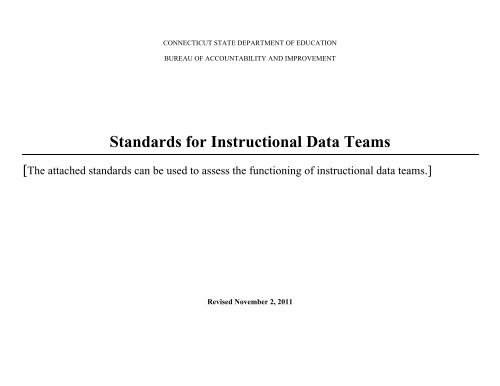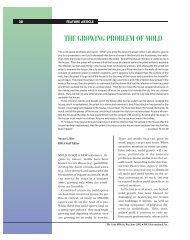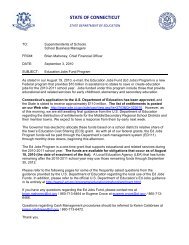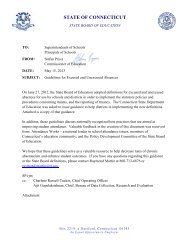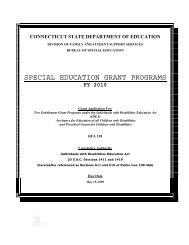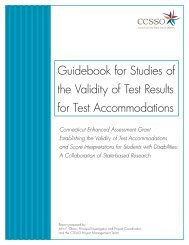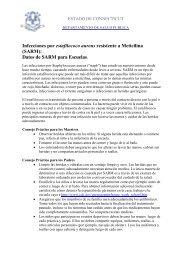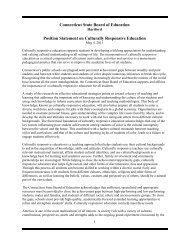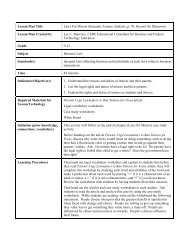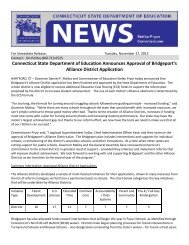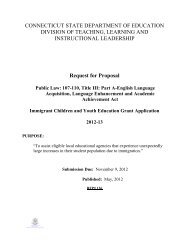Standards for Instructional Data Teams - Connecticut State ...
Standards for Instructional Data Teams - Connecticut State ...
Standards for Instructional Data Teams - Connecticut State ...
Create successful ePaper yourself
Turn your PDF publications into a flip-book with our unique Google optimized e-Paper software.
CONNECTICUT STATE DEPARTMENT OF EDUCATION<br />
BUREAU OF ACCOUNTABILITY AND IMPROVEMENT<br />
<strong>Standards</strong> <strong>for</strong> <strong>Instructional</strong> <strong>Data</strong> <strong>Teams</strong><br />
[The attached standards can be used to assess the functioning of instructional data teams.]<br />
Revised November 2, 2011
<strong>Standards</strong> <strong>for</strong> <strong>Instructional</strong> <strong>Data</strong> <strong>Teams</strong><br />
Introduction<br />
<strong>Instructional</strong> <strong>Data</strong> <strong>Teams</strong> (IDT) are groups of teachers working collaboratively in a continuous process to enhance the achievement of the students they teach.<br />
IDTs are usually composed of teachers who teach the same grade level (elementary) or same course, content area or subject area (secondary).<br />
In this second iteration of standards <strong>for</strong> best practices <strong>for</strong> <strong>Instructional</strong> <strong>Data</strong> <strong>Teams</strong>, one will find that the most important aspects of the functioning of an<br />
exemplary team has changed. In the initial version of these standards more emphasis was placed on the team’s ability to use student assessment data to in<strong>for</strong>m<br />
their work, both prior to instruction and following instruction. While this continues to be an important facet of any team’s work, it is not the factor that is going to<br />
make and sustain long-term changes in student outcomes. The emphasis in these revised standards has shifted to the actions the teachers are going to take to meet<br />
the needs of the students as defined by this assessment data.<br />
There<strong>for</strong>e, these standards ask the teams to apply the same type of assessment practice they learned with regard to students, to their own actions as adults. If<br />
students are not acquiring the skills and knowledge from instruction, the team must look at their own practice and determine how it needs to be expanded,<br />
improved, or replaced in order to facilitate student learning. These decisions concerning the professional practice of the team members in service to the identified<br />
student outcomes now become the primary focus of a data team. The extent to which the team successfully engages in this process now determines whether or not<br />
the team is rated as exemplary.<br />
This structured inquiry into improving and expanding the content and pedagogical knowledge of team members and measuring their progress is described in these<br />
standards.<br />
<strong>Instructional</strong> <strong>Data</strong> <strong>Teams</strong> continue to evolve. The standards described in this document represent the current thinking on best practice, current research, and<br />
experience with hundreds of teams in dozens of districts during the past four years. As a dynamic process, it is anticipated that these standards will continue to<br />
evolve as we, as an educational community, continue to grow in knowledge and experience.<br />
Ratings Key<br />
Not Begun – The team has not yet addressed this issue.<br />
Progressing – The team has begun working on this issue and is making adequate progress.<br />
Met – The team has addressed this issue and their per<strong>for</strong>mance meets the standard as described.<br />
Exemplary – The team has done a superior job on this issue and surpasses the standard in obvious and dramatic fashion.
<strong>Standards</strong> <strong>for</strong> <strong>Instructional</strong> <strong>Data</strong> <strong>Teams</strong><br />
<strong>Instructional</strong> <strong>Data</strong> <strong>Teams</strong> begin their work by identifying the most significant student achievement issue with which they are faced. They document this student<br />
achievement issue with data so that they can measure improvement. <strong>Instructional</strong> <strong>Data</strong> <strong>Teams</strong> then move quickly to determine the area or areas of their practice<br />
that are contributing to this student achievement issue. They identify the gap between their current level of practice and their desired level of practice. They do<br />
this by identifying the desired level and taking a baseline measure of how their current practice compares. They then design a plan to move from their current<br />
level of practice to the desired level. They document their progress with frequent measures. Finally they monitor the change in the student achievement issue as<br />
their practice changes. As teams approach this demanding work there are standards of practice that have been found to enhance the quality of their work. This<br />
document is designed <strong>for</strong> teams to compare their per<strong>for</strong>mance in a number of critical areas to those found most effective.<br />
Domain<br />
<strong>Standards</strong><br />
(Ratings noted to right)<br />
Not Begun<br />
Progressing<br />
Met<br />
Exemplary<br />
Evidence<br />
Membership<br />
Domain Rating<br />
o Exemplary<br />
o Met<br />
o Progressing<br />
o Not Begun<br />
1. Elementary – Grade level teachers plus<br />
support specialists as needed<br />
2. Secondary – Common course/subject<br />
teachers plus support specialists as<br />
needed.<br />
o<br />
o<br />
o<br />
o<br />
Structure<br />
Domain Rating<br />
Exemplary<br />
Met<br />
Progressing<br />
Not Begun<br />
1. Norms are developed and followed.<br />
(i.e. have an agenda, start and end on<br />
time, open and honest dialogue, everyone<br />
has a voice, confidentiality, etc.)<br />
2. Regularly scheduled and conducted<br />
meetings. No less than 1 hour per week.<br />
3. Roles are clearly defined (team leader,<br />
recorder, etc.).<br />
4. The team leader facilitates the meeting<br />
and rein<strong>for</strong>ces norms.<br />
5. <strong>Data</strong> facilitator records and displays all<br />
data in advance of meeting.<br />
6. Each member per<strong>for</strong>ms scoring and<br />
data entry <strong>for</strong> responsible students in<br />
advance of the meeting. (No individual<br />
scoring at meeting.)
o<br />
o<br />
o<br />
o<br />
Process<br />
Domain Rating<br />
Exemplary<br />
Met<br />
Progressing<br />
Not Begun<br />
7. Agenda is sent to all members in<br />
advance of the meeting<br />
8. Minutes are sent to all members<br />
following the meeting.<br />
1. There is ample opportunity <strong>for</strong><br />
participation by every member.<br />
2. The discussion follows the agenda<br />
(focused, time-limited) and is supported<br />
by evidence and data.<br />
3. The group stays on task.<br />
4. The team serves as a problem solving<br />
group as obstacles arise.<br />
5. Decisions made by the group are<br />
supported by all members.<br />
6. At the end of each meeting, next steps<br />
are clearly identified and a timeline<br />
developed <strong>for</strong> follow-up.<br />
Documenting the<br />
Student Achievement<br />
Issue<br />
Domain Rating<br />
o Exemplary<br />
o Met<br />
o Progressing<br />
o Not Begun<br />
1. The team has identified an important<br />
student achievement issue (i.e., effects<br />
large numbers, critical skill).<br />
2. The team has documented the student<br />
achievement issue with data (i.e. data<br />
over time, accurate).<br />
3. The student achievement issue is<br />
stated as a SMART goal.
4. The team has identified a method to<br />
collect data concerning change in student<br />
achievement on the identified issue and a<br />
schedule of data collection. (Formative<br />
<strong>Data</strong>)<br />
Documenting the Adult<br />
Practice Issue<br />
1. The team has identified the adult<br />
practice issue that is most likely to be<br />
affecting the current student achievement<br />
issue identified.<br />
o<br />
o<br />
o<br />
o<br />
Domain Rating<br />
Exemplary<br />
Met<br />
Progressing<br />
Not Begun<br />
2. The team has produced a strong<br />
rationale supporting the connection<br />
between the identified adult practice<br />
issue and the student achievement issue.<br />
3. The team has identified the desired<br />
level of per<strong>for</strong>mance concerning the<br />
adult practice through a process of<br />
reflection, research and collaboration.<br />
4. The team has identified a method to<br />
collect data concerning change in adult<br />
practice and a schedule of data<br />
collection.<br />
The <strong>Instructional</strong> Plan<br />
Domain Rating<br />
o Exemplary<br />
o Met<br />
o Progressing<br />
o Not Begun<br />
1. The team has drafted a plan to improve<br />
the per<strong>for</strong>mance of the members toward<br />
the identified desired level defined in the<br />
SMART goal. The plan contains specific<br />
actions the team members will take to<br />
reach the goal, with timelines and<br />
responsibilities noted.
2. The team uses <strong>for</strong>mative data<br />
concerning both adult practice and<br />
student achievement to adjust the<br />
strategies detailed in the improvement<br />
plan.


